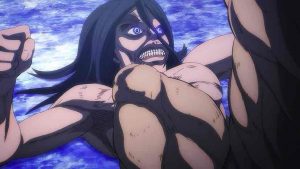 You do have to kind of pity Zeke. He launched a plan to wipe out his own people as revenge for his abandonment. And just when he finally gets the kind of redemptive moment his daddy issues demanded, his kid brother pulls the rug out from under him and ups the genocide ante (which Zeke made possible). In historical terms Zeke would be what’s called a “self-hating Jew” but in context, I think he’s largely an extension of Isayama’s psyche. If any character in this series is an author avatar Zeke seems the most likely by far – is Zeke, wishes he was Eren.
You do have to kind of pity Zeke. He launched a plan to wipe out his own people as revenge for his abandonment. And just when he finally gets the kind of redemptive moment his daddy issues demanded, his kid brother pulls the rug out from under him and ups the genocide ante (which Zeke made possible). In historical terms Zeke would be what’s called a “self-hating Jew” but in context, I think he’s largely an extension of Isayama’s psyche. If any character in this series is an author avatar Zeke seems the most likely by far – is Zeke, wishes he was Eren.
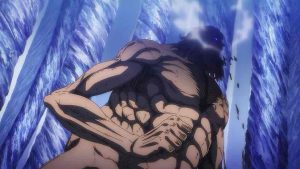 I have no idea if Isayama has daddy issues himself – he might have the most wonderful son-father relationship around for all I know, though those seem the exception in Japan rather than the rule. But in broader terms, the picture these developments paint is of an author who’s torn between guilt over Japan’s wartime atrocities and resentment over its forced demilitrization and perceived (by nationalists) humiliating subservience on the world stage. It’s a shame he decided to muddy the waters in such a nauseating way by conflating Japan with the Jews and WW II – only he’ll ever know the real reason why he did that, unless he chooses to share it (in honest fashion). Because if he hadn’t, that kind of conflict would be fascinating to see expressed through fiction (and frankly has been here, at times).
I have no idea if Isayama has daddy issues himself – he might have the most wonderful son-father relationship around for all I know, though those seem the exception in Japan rather than the rule. But in broader terms, the picture these developments paint is of an author who’s torn between guilt over Japan’s wartime atrocities and resentment over its forced demilitrization and perceived (by nationalists) humiliating subservience on the world stage. It’s a shame he decided to muddy the waters in such a nauseating way by conflating Japan with the Jews and WW II – only he’ll ever know the real reason why he did that, unless he chooses to share it (in honest fashion). Because if he hadn’t, that kind of conflict would be fascinating to see expressed through fiction (and frankly has been here, at times).
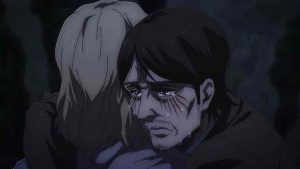 An episode like this makes you yearn for the simplicity of something like Sabikui Bisco or even Kimetsu, which doesn’t force you to think about this sort of thing. But I guess there’s something to be said for a series that does make you consider such matters – whatever else it is, Shingeki no Kyoujin isn’t devoid of ideas. I can’t imagine even a nationalist like Isayama would call what Eren’s doing the right thing – which would mean we certainly can’t call Eren the hero of the series (at least I hope not). But Zeke’s plan is simply Eren’s on a smaller scale and even stupider. I don’t know if anybody’s got a side worth rooting for here but if they do, I don’t think they even have a place at the table.
An episode like this makes you yearn for the simplicity of something like Sabikui Bisco or even Kimetsu, which doesn’t force you to think about this sort of thing. But I guess there’s something to be said for a series that does make you consider such matters – whatever else it is, Shingeki no Kyoujin isn’t devoid of ideas. I can’t imagine even a nationalist like Isayama would call what Eren’s doing the right thing – which would mean we certainly can’t call Eren the hero of the series (at least I hope not). But Zeke’s plan is simply Eren’s on a smaller scale and even stupider. I don’t know if anybody’s got a side worth rooting for here but if they do, I don’t think they even have a place at the table.
 There’s something quite insidious about that scene with Eren and Ymir, riveting as it was. Eren’s perspective is alluring, and you can feel the pull of it in that moment. And Ymir’s backstory being inserted as and where it was is designed to enhance that allure. Victim complexes can be incredibly powerful things, especially when the one wrestling with them has the power to lash out at the world in a destructive fashion. Why should Ymir want to do as Zeke orders her – haven’t her people been doormats long enough? Is it so wrong to pay the world back ten times over for all the pain they’ve felt?
There’s something quite insidious about that scene with Eren and Ymir, riveting as it was. Eren’s perspective is alluring, and you can feel the pull of it in that moment. And Ymir’s backstory being inserted as and where it was is designed to enhance that allure. Victim complexes can be incredibly powerful things, especially when the one wrestling with them has the power to lash out at the world in a destructive fashion. Why should Ymir want to do as Zeke orders her – haven’t her people been doormats long enough? Is it so wrong to pay the world back ten times over for all the pain they’ve felt?
 Setting aside the historical allegory (if only it were so easy), strictly in terms of the fictional situation in Attack on Titan there’s surely a third way. Someone with Eren’t magic powers could do what Armin has convinced himself Eren was planning to do – sure, do a genocide, but a selective one. You know, only against those other bad people. Unfortunately this has been wish-fulfilment on Armin’s part, another example of how the smartest person in the cast has gotten dumb in the interest of plot convenience. But now that he knows the truth, what do he – and Mikasa – do? Forget the Jaegerists, I assume they’re going to be so broken by all this that they’re stumbling around like Ymir’s golems. But Armin and Mikasa at the very least have to choose a side now.
Setting aside the historical allegory (if only it were so easy), strictly in terms of the fictional situation in Attack on Titan there’s surely a third way. Someone with Eren’t magic powers could do what Armin has convinced himself Eren was planning to do – sure, do a genocide, but a selective one. You know, only against those other bad people. Unfortunately this has been wish-fulfilment on Armin’s part, another example of how the smartest person in the cast has gotten dumb in the interest of plot convenience. But now that he knows the truth, what do he – and Mikasa – do? Forget the Jaegerists, I assume they’re going to be so broken by all this that they’re stumbling around like Ymir’s golems. But Armin and Mikasa at the very least have to choose a side now.
 It certainly stands to reason that Isayama had all this planned from the beginning – the pieces fit together in a fascinating combination of artfulness and ludicrousness. The advantage of Isayama’s inability to write three-dimensional characters is that they could be twisted and manipulated as necessary to make those pieces fit with no worry about their own development. That makes the rare exceptions stand out all the more, but this series is about nothing if not the casualties trampled underfoot in the relentless march to Isayama’s chosen endgame. It’s certainly a unique spectacle, there’s no denying that.
It certainly stands to reason that Isayama had all this planned from the beginning – the pieces fit together in a fascinating combination of artfulness and ludicrousness. The advantage of Isayama’s inability to write three-dimensional characters is that they could be twisted and manipulated as necessary to make those pieces fit with no worry about their own development. That makes the rare exceptions stand out all the more, but this series is about nothing if not the casualties trampled underfoot in the relentless march to Isayama’s chosen endgame. It’s certainly a unique spectacle, there’s no denying that.


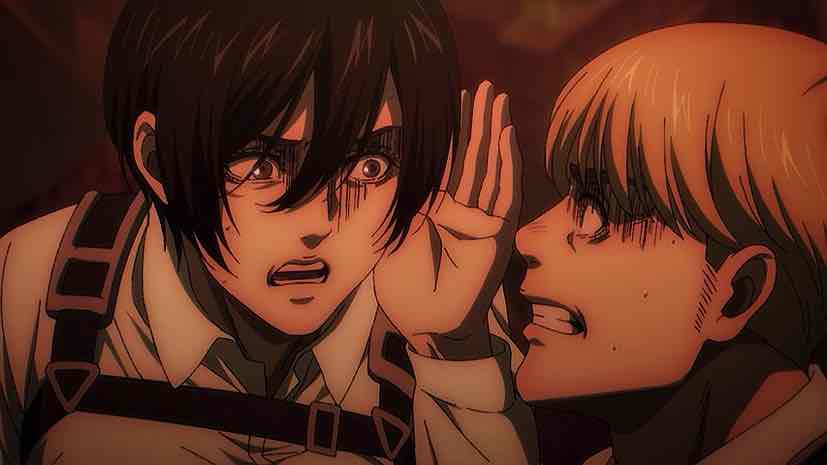

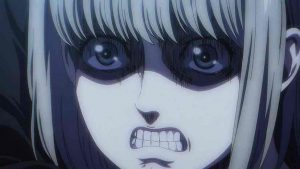
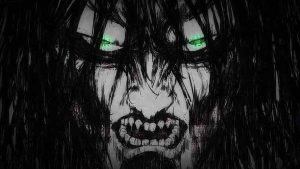
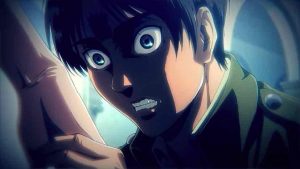


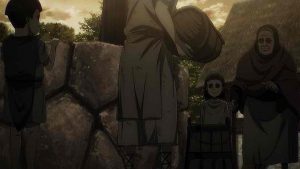
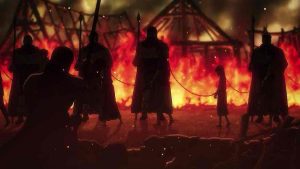
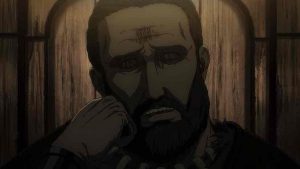
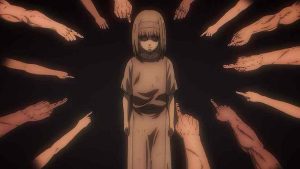

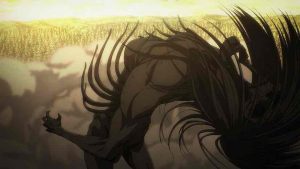

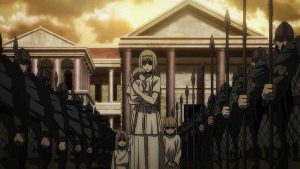
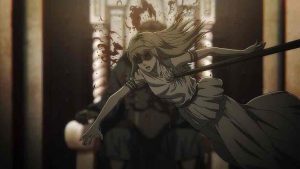

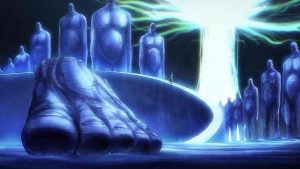

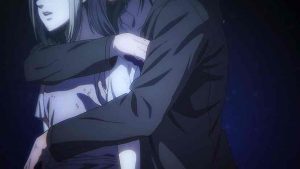
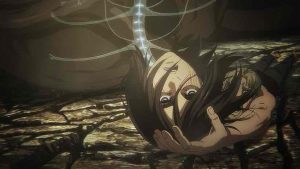

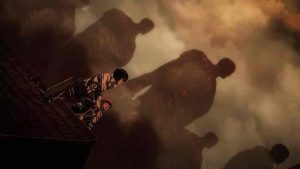
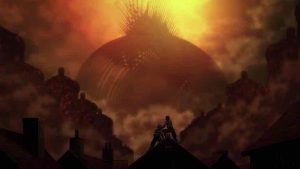

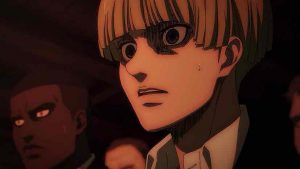
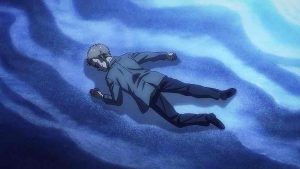

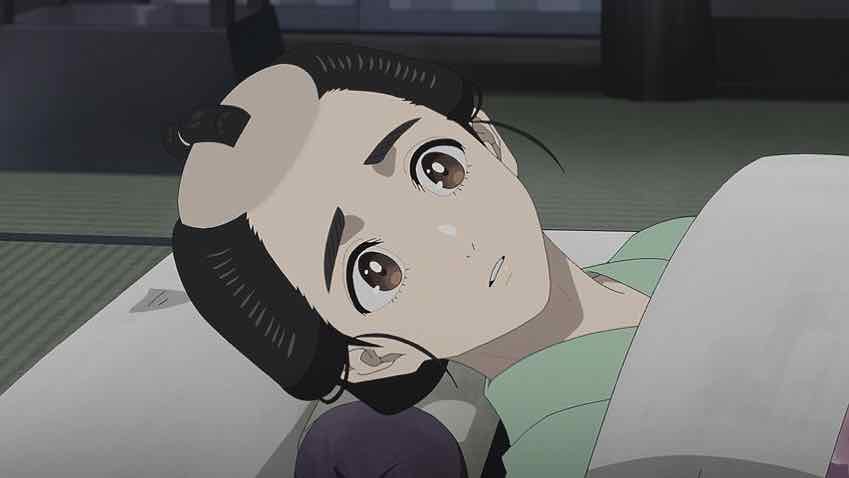
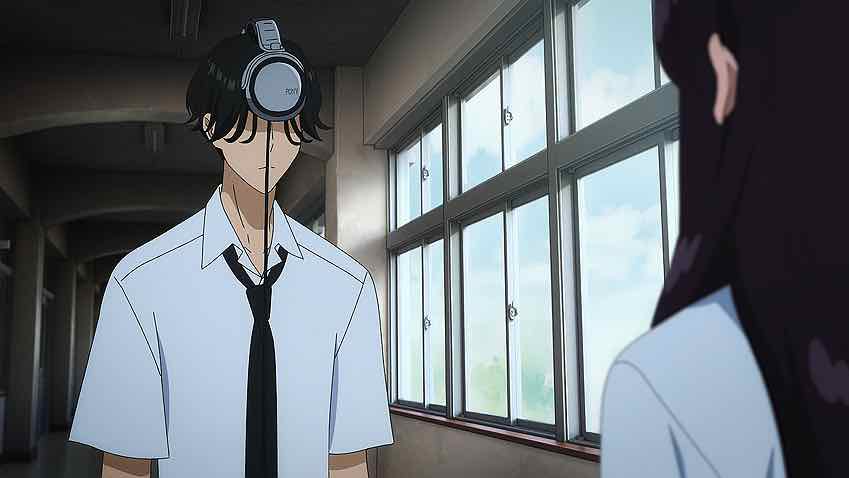
Simone
February 8, 2022 at 10:15 pmI think you’re being a bit unfair to Armin here. Paradis is at war. The Rumbling Titans are a weapon. It’s entirely reasonable (and IMO not that immoral – they’re defenders in a war of aggression) to think that Eren might want to use them to do the logical thing, and simply send them to e.g. cripple Marley’s military capability, smash their ports and fleets or a few military bases, and basically end the war then and there. Yes, it wouldn’t be bloodless, but insofar as self defence goes, that much is legitimate. What Eren’s actually doing is WAY beyond that though. And remember that this all takes place over a few seconds even though for us it’s been two episodes, they see Eren and Zeke touching, the walls instantly disintegrate, Armin goes “oh yay I was right Eren’s not actually Zeke’s ally!”, cue literally ten seconds later the realisation that he’s about to do something even more monstrous. Smart or not, I can’t blame him much.
I definitely think the Japanese parallels are there. The Jewish/Holocaust parallels I remain convinced were just a (probably badly chosen, from our sensitivity’s perspective) very in-your-face visual shortcut to clarify what the Eldians’ situation in Marley was. Just because there are parallels between Eldia and Japan doesn’t have to mean IMO those parallels have to be taken literally to their extreme extent – neither “Jews were actually at fault for their own oppression!” nor “Japanese are actually treated as badly as Jews in the Holocaust!” (two interpretations that would be contradictory to each other anyway). Metaphors aren’t always meant to be taken that far. I don’t think either thing was the core author intent here.
Guardian Enzo
February 8, 2022 at 10:32 pmAs I said we’ll never know why, unless Isayama chooses to share that information honestly. But of course the two possibilities you referenced are the two obvious ones – which I chose not to say in the post but you went straight to anyway. I would argue that they’re not truly contradictory, but irrespective of that either of them would be a reprehensible argument to make. And the fact that even you, who believes they weren’t the author’s intention, immediately gravitated towards those ideas means at the absolute barest of minimums Isayama made a big mistake out of historical ignorance by using the symbolism he did.
Simone
February 8, 2022 at 11:40 pmEh, it’s more that they were my “what would be the most offensive possible take aways from this?” choice. Honestly I think there’s nothing of the first, and perhaps a bit of the second – but more in terms of non-European countries simply assigning less gravity as a whole to using Holocaust symbolism. It’s something that has become a bit of a cultural taboo, for good reason, but obviously the strength of that taboo isn’t the same everywhere (just like for example when it comes to black-white racial relations the US have their own string of things that carry additional meaning that other places wouldn’t instantly get).
So, sure, you can take it as a blunder, and it could at least have been done more subtly (even without EITHER interpretation, placing characters in ghettos with literal yellow symbols sewn on their shirts is hardly the height of creativity as far as ways of signalling that they’re persecuted go. Really, it’s hammer-in-yo-face writing). But I think it’s also better to not project too much. Reminds me of how I was sure that in Fullmetal Alchemist the Amestris-Ishval dynamic was commentary on the Israel-Palestine one, but then I found out Arakawa said explicitly the latter were meant to reference the Ainu. Neither interpretation would have been as problematic of course, but it’s an example of how common it may be for us to just see in fiction the things that we’re used to in our specific corner of the world, even when someone is thinking of something else entirely.
Orion Taylor
February 9, 2022 at 3:42 amI’ve got nothing insightful to say, but it’s very interesting to see this specific conversation between you two play out for a second time (the first time being in the Episode 56 comments), given the new information available to both of you (a manga reader and an anime-only respectively).
Guardian Enzo
February 9, 2022 at 7:11 amAnd it doesn’t seem like either of us has changed our minds much, either. I’m sure we’d each have a different interpretation of why that is, LOL. As long as the disagreement happens in a civil manner I’m fine with playing it out.
Simone
February 10, 2022 at 8:23 amHaha, I forgot about that but yeah, sounds plausible we already went through this. I know my ideas on the topic haven’t changed much (and absent any radical new material from Isayama, there’s probably not much reason for them to – that’s the data we have, the chips are down at this point). Honestly I don’t remember the details but that’s been my impression the whole time. I find it interesting that AoT pulls at least this much thought out of people for good or bad – even the whole debate about what Eren is doing here (that I’m now seeing replaying after seeing it already in the manga) is an interesting reflection of different viewpoints on what moral obligations one has towards other people vs. one’s own tribe/family/friends/country and so on. You can take it as a bit disheartening but I think it’s definitely interesting that such a deep divide is made manifest by discussing this sort of story, and I’d say it’s more thought provoking than a much more clear cut scenario.
Marty
February 9, 2022 at 1:09 amI will say, ever since the reveal of the wall titans, I’ve always wanted to see what would happen if the rumbling came about. While the narrative step needed to get there were ludicrous to say the least, I will confess it would’ve been disappointing for the wall titans never to have walked.
That being said, I’m pretty sure Isayama has written the 21st century’s most popular fascist fantasy. Let’s keep it real, a core tenant of fascist ideology is “the world is out to get us, so we must strike back at them,” by accusing the world to be their enemy, fascists throughout history have justified their own atrocities.
In this final arc, Isayama basically crafted that world. Since the world powers of AOT fell in line with Marley’s hatred of the Eldians, it makes Eren’s genocidal March of the titans seem reasonable, at least to a disturbingly large number of the anime community.
Guardian Enzo
February 9, 2022 at 7:00 amYes, which is what I think a lot of folks without a sense of history with fascism don’t understand. This is all right of the fascist playbook. Rick Steves actually has a very good documentary about historical fascism in Europe that does an excellent job of breaking down that playbook to its core elements.
sonicsenryaku
February 9, 2022 at 8:43 amHaha that’s so hilarious because when I was watching this week’s episode and Armin shouted out, “We won,” I thought to myself funnily enough: “watch Enzo run to the bank with this and think this somehow validates his position that Armin has been hit with the stupid stick.” No; you still aren’t correct about Armin being stupid for plot sake, and you never will be (This is all in good fun by the way, I’m not attacking you or anything; I just find it funny that you’re willing to die on this hill that Isayama hates characters like Armin and has made him stupid for no other reason than to push the plot along. Just wanted to make that clear)
Preamble aside, I guess the question is, what is it about Armin believing in Eren that makes him so stupid to you? What is it about Armin being okay with using the rumbling to defend themselves from genocide that you find stupid and contrived? As Simone said, they’re in a war and the rumbling are the weapons they possess to be able to defend themselves against the opposition. The people of Paradis have been pushed to a point, thanks to the events that happened in Liberio, that using their weapons is the only way to survive. I’m not sure if you recall, but in Season 4 part 1, we can see that Armin is initially against using the rumbling. He’d rather take the peaceful approach to solving the differences between Paradis and Marley, especially after doing recon there during the four years, rather than scaring them into submission. Armin realizes that even though it would be possible to use the rumbling to scare the other nations, that would never be true peace; it’s part of his conflict in season 4 part 1 as indicated by his dialogue. As a result, he’s confused and not sure what to do and even visits Annie to express his confusion. The whole middle part of Season 4 part 1 was our cast of characters debating about the implications of using the rumbling, with Eren being vocal about supporting it like, “Yeah, I’m about this life, let’s do this shit,” keeping his more sinister machinations close to his chest. Armin only gets on board with using the rumbling when it posed itself as the only option to defend themselves, especially as it became clear that there were forces coming to paradis island to annihilate them all. And that’s the other thing: Armin never once implies he’s okay with condoning Eren in genociding a whole country of people. Armin thoughts are represented in clear dialogue once the rumbling starts, in that he thinks Eren is about to use it to crush the allied forces in Marley, i.e. the militia that’s gathering there, not actually genociding Marley.
Armin’s characterization and motivations have been clear and consistent since jump street. Violence is always the last result for him, but one he is reluctantly willing to use if it means he and the people he cares about will survive. When Eren pulls the stunt he does in Liberio, Armin is rightfully confused why Eren would risk his friends life the way he did. He can only think to himself: “what changed Eren in those 2 years he was by himself; did Zeke get to him somehow?” You claim that a smart person like Armin should be able to see that Eren doesn’t deserve the benefit of the doubt, but again, why? You can’t just say those things without actual proof from the storytelling itself. You claim Eren has done nothing to deserve this much trust from Armin but I’ll say it again: why wouldn’t Armin believe Eren has their best interests in mind? This is the same guy who gave his life up to save Armin is ep 5 of the first season; the same guy who didn’t want to compromise by sacrificing any of his friends or comrades in the fight against the titans; the same guy who was incredulous when he learned that the people he formed bonds with were traitors; the same guy who cried and wanted to die when he found out that he could potentially be a threat to humanity (which at the time only consisted of the people of Paradis in his mind); the same guy who told his friends he cherished them over anything else in the world; the same guy who would always protect Armin from bullies when they were younger. You’re trying to tell me that with all that, Eren hasn’t earned Armin’s trust and loyalty? That with all that, Armin should be “smart enough” to say, “Nah fuck Eren; I don’t trust that he would never side with Zeke. I don’t trust that Eren would never betray us.” I would foul play on Isayama if Armin wasn’t vouching for Eren, as that wouldn’t be consistent with who Armin has been established to be at all. You try to defend your claim of Armin being stupid for plot sake after his interaction with Yelena, but that fell apart too when it became clear that Armin was never on board with Yelena’s ideology and was just playing her. At the end of the day, Armin wasn’t wrong about Eren: he said Eren would never forsake them and he was correct. What he didn’t anticipate was just how far Eren was willing to go to ensure that his people on Paradis Island would be safe. No matter how smart Armin is, what in the storytelling would be an indication to anyone that Eren couldn’t be trusted? Eren being a loose cannon as a teen doesn’t equal he can’t be trusted to have his friends’ best interest in mind; you’re conflating the two things.
If you can cite concrete reasons from the story itself that prove without a shadow of a doubt that Eren shouldn’t have garnered the kind of trust Armin has in him, I’d be more inclined to see your point of view as to how contrived it is; but as of right now, your position feels unjustified based on what has factually played out in the story
Marty
February 9, 2022 at 10:10 amArmin thinking Eren was just going to stop with a brief show of force is the equivalent of thinking Germany will stop if people just give them the Sudetenland. What makes Armin’s belief particularly egregious is that he has known Eren their entire lives damn near, u mean to tell me he didn’t see any hints at all of Eren’s insanity?
sonicsenryaku
February 9, 2022 at 11:02 amCome on man; that’s not the same thing. Explain why Armin should have known based on the relationship they’ve had throughout the story that Eren was going to commit planetary genocide. Marley is one thing; but the entire world?? Tell me at what point in the narrative, should Armin have been like, “Yeah, if Eren ever got his hands on the rumbling, he’d want everyone in the world dead!” While Armin and Mikasa were always aware that Eren was a loose cannon, they never had a reason to assume human life was something that was disposable to Eren, teen rage fits or not. To Mikasa, Eren killing those rapist was an act of justice to protect her; to Armin and Mikasa, Eren’s voracious hate for the titans was justified by them having killed his mom and them also just being monsters. Throughout the first three seasons of AoT, Eren showed that even though he was a volatile person, there was a line he wouldn’t cross; and that line would be to knowingly kill innocent people if he had the power and agency to avoid it. If i had a friend who was narrow-minded about killing all the titans, but showed compassion for human life and his comrades, why would I assume that this rage would also translate to having disregard for all innocent life? It is for this reason that Mikasa and Armin are distraught and extremely disappointed in Eren during the fight at Liberio when they learn that he knowingly, without there being a need for self-defense, killed innocent adults and children, which forced them to have to do the same. It’s this moment in Liberio that showcases the first time Eren making the conscious decision to blatantly attack innocent people, which the whole reason why Armin and Mikasa feel unsettled by him and come to the belief Eren was brainwashed by Zeke or some shit. You make it seem like Eren has always shown blatant signs to Armin and Mikasa that he would be willing to kill innocent people throughout his life and the show when that hasn’t been the case at all.
Besides, whether or not Eren would use an extreme version of the rumbling wasn’t even the point of Armin’s argument. The question at hand was simply: Would Eren forsake his friends? Armin argues that because Eren cares about them, he would never forsake them and therefore, would not side with Zeke; Was Armin not correct about that?? You’re conflating Eren’s capacity for the extreme with the simple argument Armin was making for his friend based on factual details. All Armin was saying was that there was no way he’d side with Zeke and betray Paradis, so when the rumbling started, that confirmed to him that Eren gave Zeke the big “Fuck you.” It only took about 10 seconds for Armin to realize that despite said “fuck you,” something was seriously wrong.
Guardian Enzo
February 9, 2022 at 1:39 pmI don’t want to get too deep into the whole Armin thing because honestly, I think he’s become largely irrelevant to the story and has been for a long time. I’m sure it won’t surprise you that I agree with Marty’s assessment more or less, but the larger point is that Armin is basically wrong about everything and has been (or so we now know) from the start, Every decision he makes is, in Isayama’s view, wrong.
I have my own take on Armin, which common sense is telling me it would better not to elaborate at this stage of the game, but what the fuck. Basically Armin is a classic straw man – he represents everything Isayama thinks is weak and pathetic about “establishment” Japanese power figures who haven’t stood up for the country’s right to arm and fight in the global arena. Hell, Isayama has even mocked Armin directly (the “she” comments and such). I think Armin has been this from the very beginning – the epitome of everything wrong with Japan (as Isayama sees it). I’ve always felt he wrote Armin as if he despised him (just as Suetsugu writes Arata as if she’s in love with him). Too quick to accept responsibility for past offenses, too weak to take the necessary action, too obsessed with finding harmonious solutions. Intelligent, sure, but wasting his intelligence in support of misguided ideals. What a loser.
Where this gets unintentionally funny and rather ironic is that if you’re a readerviewer like me, who finds Isayama’s worldview to be pretty warped, Armin was the only one making sense most of the time. While Isayama was deriding him through his writing, for some of us he was actually building him up. It’s just that we’ve reached the point where most of the major secrets are out in the open, so the distinction no longer matters.
sonicsenryaku
February 10, 2022 at 3:56 amWhy is common sense telling you not to elaborate? Dude this is your blog; by all means share your thoughts whether you think people will agree or disagree with you; who cares. You always seem so reserved to share your thoughts on AoT; and yea i get it, fans can be ravenous, but I don’t it would hurt to be more confident in giving people a try to respond to your opinions in a civil way, whether it has opened a can of worms in the past or not. Yea for the most part, I think you’re off-base with a lot of your reads on characters given what the show has explicitly shown us, but I genuinely find your takes interesting nevertheless, like your assessment of Armin, even if i believe you’re a projecting a wee bit too much. The things you’ve said here are intriguing and I’ll definitely be watching the rest of the show and reflecting on past episodes with those things in mind
sonicsenryaku
February 10, 2022 at 3:57 amI don’t think*…..sadly requesting a comment edit feature on this blog 🙂
Guardian Enzo
February 10, 2022 at 7:48 amYou don’t see the stuff that’s winds up in the spam filter, lol.
I take your point, but the level of savagery i see in AoT discussions is really revolting. Part of it is not wanting to go down that road. But it’s also because, like I said, at this point I think Armin is basically irrelevant and has been for a deceptively long time. It seems kind of a dead-end to have an extended debate on him (though I still find him the most interesting character in the series) when there’s so much else to litigate.
Simone
February 10, 2022 at 8:33 amI really don’t get that at all from the story? Armin is virtually the soul of the story, the one moral compass for everyone, the one guy who’s actually seriously thinking about what’s right and wrong beyond just wanting to win or protect his country or whatever. Your perception is affected by the idea that you think Isayama despises this, but I don’t think he’s that negatively portrayed at all. Like, why should being compassionate or trusting to the end such a dear, long-time friend mean he’s “stupid”? It’s what a good person would do, sometimes maybe to a fault, but it’s understandable. It doesn’t make him weak, and the story doesn’t go out of its way to portray him as such. Sometimes it feels like if a show doesn’t put up large flashing signs reading THIS IS GOOD and THIS IS BAD over characters, people immediately assume it’s actually being cynical or something. I really don’t think this is the show’s intent, it’s just leaving judgement to the viewers.
Guardian Enzo
February 10, 2022 at 10:37 amIt’s all down to interpretation, and I do see it differently with Armin. I think Isayama does go out of his way to make him look weak and foolish, a lot actually. And I mean, he’s dismissed Armin in so many words in real life.
sonicsenryaku
February 10, 2022 at 3:26 pmWhat do you mean, “In real life?” Has he outwardly said anything about Armin in interviews or something?
Guardian Enzo
February 10, 2022 at 4:30 pmThere are a couple of instances I’m aware of, including calling Armin “she” at least once (can’t remember if that was a tweet or on his blog or something).
Stewart
February 11, 2022 at 7:39 amHow long ago was that thought? It’s possible that he changed his mind since then. He said in a video interview in 2019 that he wishes he was more like Armin and interesting enough a certain salty portion of manga readers are convinced Armin is his self-insert(has to do with later material). The Aot manga fandom on all sides likes using his interviews when arguing about the story even ones from 2014 and I’ve never seen him saying he dislikes Armin being referenced. Armin being arguely dumbed down for this phase of the story feels more like it was done for the plot then out of spite. Isayama wants and has been building up to Eren starting the full rumbling. If the characters made smarter decisions getting Eren to this point would’ve been harder for Isayama and require more effort. It really shows in some of the later chapters that Isayama was trying to rush the manga to its conclusion. Also this “final” season is still not likely to finish the story. There is still a decent amount of material left that can’t be cover in the seven episodes that remain especially since many are going to adapt one chapter per episode based on the episode titles Reliable leakers( who have gotten everything about this season right so far) have said that this part will end at chapter 131 of the manga’s 139 chapters. We think there will be a movie for next year that will adapt whats left. I enjoy your reviews even if I don’t agree with all your views on the story and look forward to reviews on the rest of this episodes because I think they paint a clearer picture of what the story is admittedly clumsy trying to get across.
Guardian Enzo
February 11, 2022 at 8:24 amThanks, appreciate the input. Like I said a lot of it comes down to interpretation. I guess one could argue Isayama changed his mind but honestly, I don’t see any growth in him as a writer so it seems like a stretch to me that he’d have grown in this one specific area that’s necessary to justify one’s interpretation of a character.
As to finishing the story in a movie, that would be a total dick move.
Simone
February 12, 2022 at 5:02 am“Attack On Titan: The Final Season: Part 2: The Movie: THE FINALENING”
Simone
February 11, 2022 at 11:45 pmThis and other comments he’s then released about later events in the manga make me think he DID actively change his mind a lot throughout publication of the manga. Twelve years are a long time. I think part of the confusion also about its politics might be even because his actual politics, as a person, may not have stayed perfectly consistent throughout the run (I would say: have improved, because honestly I think the ending gets a lot more nuanced about violence and nationalism than the beginning felt like). The broad strokes of the story were obviously planned from the get go, but details and presentation may have changed, or have been developed on the fly.
It’s also possible that he both sees Armin as somewhat frustrating and still as mostly right. There is such a thing as acknowledging that the world is complex while also wishing that it could be simpler, or even simply that you could BELIEVE it is, which would make politics and ethics a lot easier. These aren’t topics on which it’s straightforward to have one-dimensional feelings.